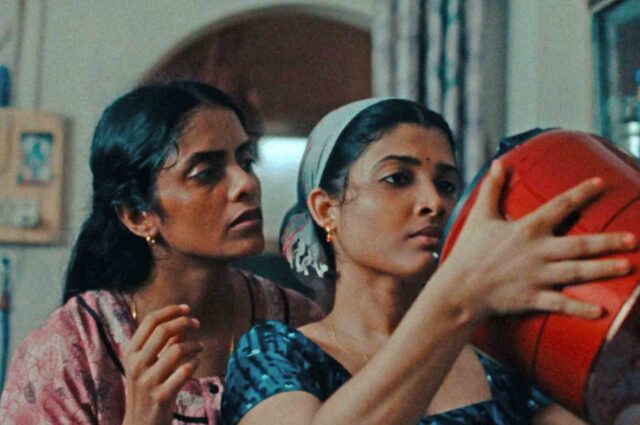A Grand Prix winner at Cannes, Payal Kapadia’s second feature, All We Imagine as Light, is constitutionally such a restrained, temperate, no-feelings-hurt movie it’s a wonder it got noticed at all. Some arthouse movies, wherever they’re made, strive to blister, scorch, discombobulate, or stress-test our film-viewing capacities, but not Kapadia’s. It is as calming and undemonstrative as its heroine, Prabha (Kani Kusruti), a middle-aged nurse in Mumbai who mostly suffers her patriarchal culture in watchful silence. This is the kind of film that usually gets overlooked by festival journalists, who are saddled with an inhuman diet of four or more films a day for days on end. But somehow, it emerged triumphant (it scored at the New York Film Festival, too), perhaps tempting our underdog sympathies by being the quiet and too-neglectable voice in the room.
All We Imagine as Light is very much and very intimately the director’s film: You can feel Kapadia’s warmth and reticence, as she pulls back — from the edge, from crisis, from any kind of emotional intensity — in every scene. She herself might well be, like Prabha, someone you’d like to have at your bedside when life offers crises enough, but this saturating sensibility doesn’t make the film boil in the memory. The story’s problems are divided between three women: Prabha, who is alone because her husband in a family-arranged marriage emigrated to Germany years ago and never returned; Anu (Divya Prabha), her younger roommate and nursing colleague, who is in love with a Muslim boy and must keep their meetings secret; and Pavarty (Chhaya Kadam), a widowed cook at the hospital who’s being squeezed out of her apartment by developers.
Everyone in the film, including many fleeting figures on the street, their voices ruminating on the soundtrack, are from provincial villages, where Hindi isn’t the language they know. Nobody seems to feel at home in Mumbai, the pace and hectic press of which feels quite like the Hong Kong of early Wong Kar-wai — minus the swoony romanticism. Kapadia has little appetite for conflict but her eye is sharp, and large swatches of her film are consumed by documenting Mumbai’s gritty ebb and flow with Cassavetesian acuity: commuter rails, cramped quarters, crowded streetlife (providing cover for Anu’s rendezvous), overflowing waiting rooms, nighttime tea shops, etc., a commercialized city symphony that’s as passionate about realist texture as it is ambivalent about the city itself.
The wariness, expressed with sensitivity but also nail-hitting solemnity, is organic; the film is built around the delicate indexing of how women must survive in India, which most often means sticking together (Prabha flouts some rules, as when she hands birth control to a begging patient for free so she can’t be impregnated one more time), and enduring the culture’s oppressive misogyny with stoic resolve. You can tell simply by looking at Kusruti’s deep-set eyes that Prabha has seen enough to know that these three women have no real options, no opportunities for autonomy.
There are a few modulated expressions of this gender-fied dead end, as when Anu dons a burqa so she can pass for a Muslim woman and meet her boyfriend at his empty house for sex — then loses her nerve and abandons the plan, wandering the streets alone. But by the time we get to the film’s last act, when Prabha and Anu help Pavarty relocate to her native village by the beach, and a near-drowning provides Prabha with a dash of magical thinking, Kapadia’s film has made its critique repetitively and without much risk, variation, or energy. Her restraint is a little frustrating — you look back at the strangulating power of films with similar thrusts, like Jafar Panahi’s The Circle (2000), and All We Imagine as Light (the overly poetic title doesn’t sharpen things) can feel as repressed as its women.
‘All We Imagine As Light’ is playing at the Roxie Cinema, 3125 16th Street.





